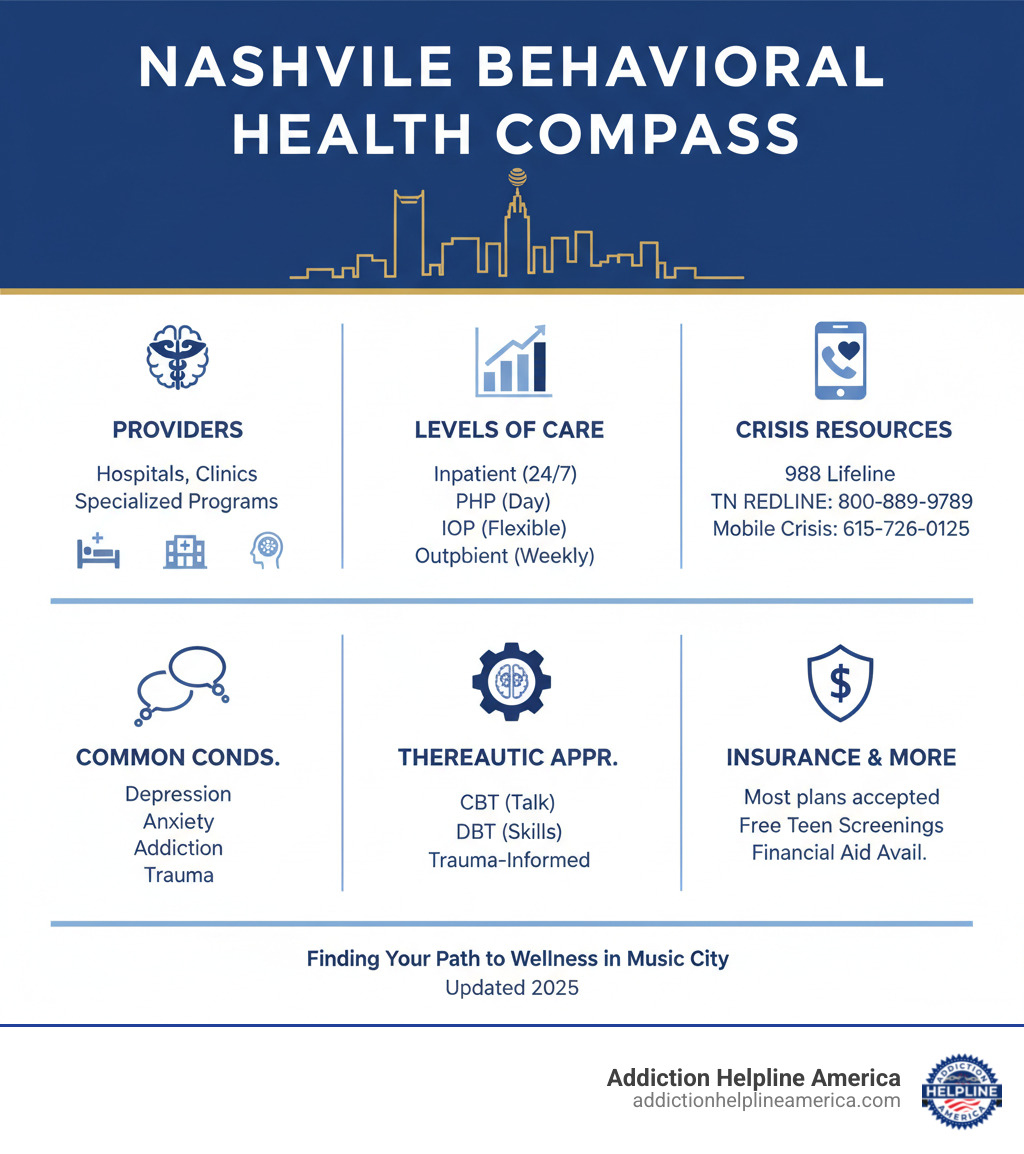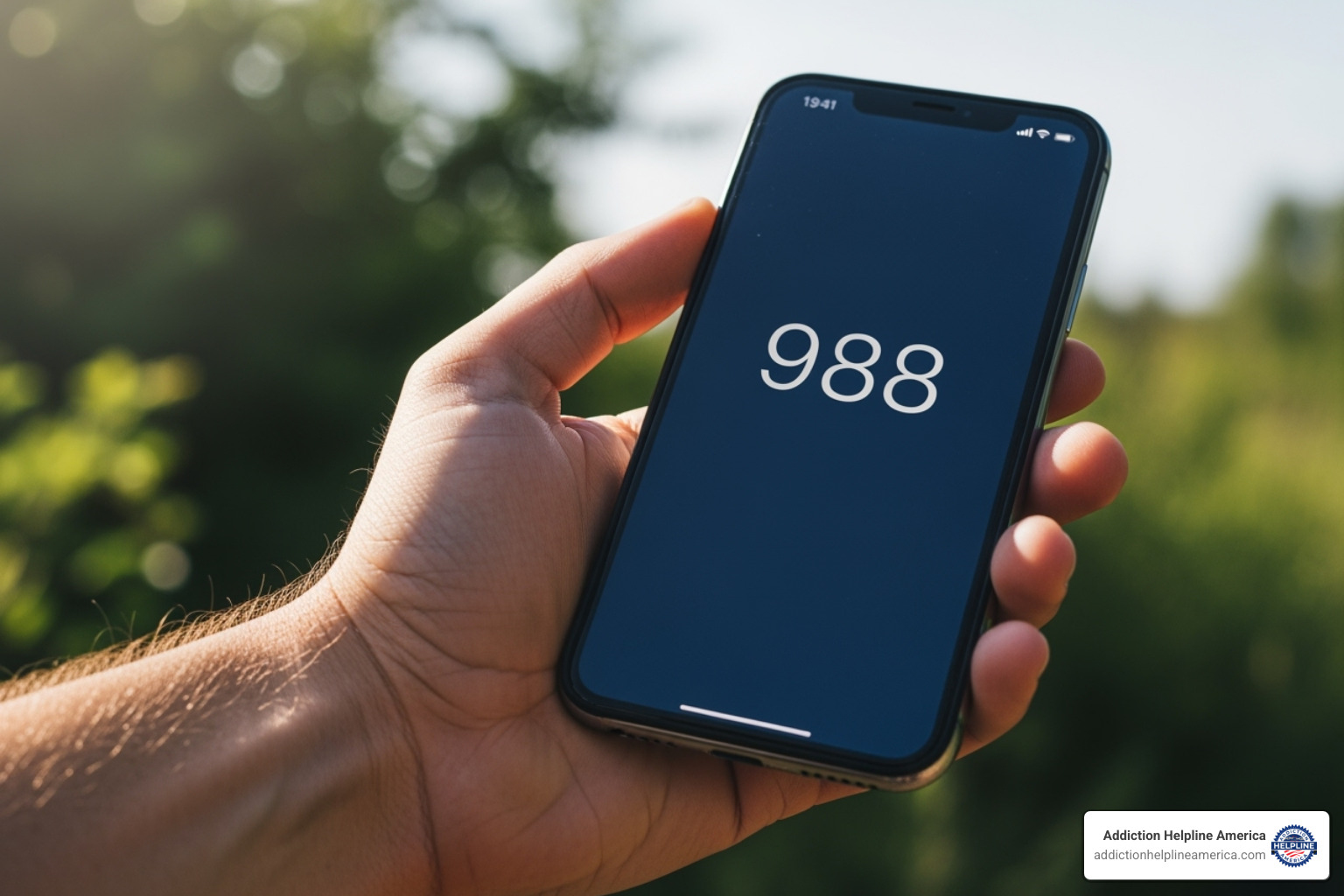
Navigating Your Path to Wellness in Music City
Behavioral health Nashville services offer comprehensive mental health and substance abuse treatment through a network of hospitals, clinics, and specialized programs. Here are your main options:
Top Nashville Behavioral Health Providers:
- Vanderbilt Behavioral Health – Full range of services, only pediatric inpatient provider in Middle Tennessee
- Ascension Saint Thomas Behavioral Health Hospital – Adult and senior programs with 24/7 crisis support
- Nashville General Hospital Behavioral Health – Individual therapy, group therapy, psychiatric services
- Rogers Behavioral Health Nashville – PHP and IOP programs for children, adolescents, and adults
Levels of Care Available:
- Inpatient Treatment – 24/7 supervised care for severe symptoms
- Partial Hospitalization (PHP) – Day treatment programs
- Intensive Outpatient (IOP) – Flexible evening or weekend programs
- Traditional Outpatient – Weekly therapy sessions
Crisis Resources:
- 988 Suicide & Crisis Lifeline – 24/7 mental health support
- Tennessee REDLINE: 800-889-9789 – Addiction information and referrals
- Mobile Crisis: 615-726-0125 – On-site crisis intervention
Nashville offers evidence-based treatments like CBT, DBT, and trauma-informed care for depression, anxiety, addiction, and other challenges. Many providers accept insurance, and the Health Department offers free screenings for teens ages 13-17.
At Addiction Helpline America, we help individuals and families steer behavioral health Nashville resources. Our team connects you with the right programs, verifies insurance, and provides ongoing support throughout your recovery.
The Landscape of Behavioral Health in Nashville
Beyond its music scene, Nashville has an impressive network of behavioral health Nashville services, creating a supportive community for healing. Compassionate professionals are ready to guide you on your wellness journey.
Nashville’s behavioral health landscape focuses on personalized care. For example, Nashville General Hospital offers individual therapy in a safe space to explore your thoughts and feelings without judgment.
Group therapy programs leverage the power of shared experiences, offering peer support and building coping skills in a nurturing environment.
Psychiatric services and medication management are also available. Psychiatrists work with you to find the right approach, combining medication and therapy based on your recovery goals.
Many facilities use collaborative treatment teams, bringing together specialists like psychiatrists, therapists, and social workers to address all aspects of your wellbeing.
Common Conditions Treated by Behavioral Health Nashville Providers
Behavioral health Nashville providers understand you’re not alone, and effective treatment is available for whatever you’re facing.
Depression can cause persistent sadness and make daily tasks feel overwhelming. Nashville’s centers offer specialized programs with proven therapies to help.
Anxiety disorders, from generalized worry to panic attacks, are treated with practical coping strategies to help you regain confidence.
Living with bipolar disorder involves significant mood swings. Nashville specialists use medication and therapy to help stabilize these fluctuations.
Trauma and PTSD can leave lasting emotional wounds. Providers use trauma-informed care to help you process memories and build resilience safely.
Substance use disorders are a significant challenge in Tennessee. Specialized programs address addiction with understanding and without judgment.
ADHD affects both children and adults. Treatment helps develop better focus and self-management skills.
Co-occurring disorders, where mental health and substance use issues exist together, are treated simultaneously for better outcomes.
Specialized Therapies and Approaches
Nashville’s therapeutic approaches are carefully chosen tools that match your specific needs and goals.
Cognitive Behavioral Therapy (CBT) is a practical approach that helps you change negative thought patterns fueling depression and anxiety, providing long-lasting skills.
Dialectical Behavior Therapy (DBT) combines CBT with mindfulness to help manage intense emotions, improve relationships, and handle distress.
EMDR is an evidence-based treatment for trauma that helps process distressing memories, reducing their emotional impact.
Holistic therapies address the mind, body, and spirit. Nashville providers integrate yoga, meditation, art, music, and even equine therapy with traditional treatments.
Trauma-informed care ensures treatment environments are safe and non-triggering. Providers understand trauma’s effects and prioritize healing over re-traumatization.
For severe, treatment-resistant conditions, advanced options like Electroconvulsive Therapy (ECT) and Transcranial Magnetic Stimulation (TMS) are available at facilities like Vanderbilt and Ascension Saint Thomas, offering new hope for severe depression, bipolar disorder, and schizophrenia.
You can learn more about addiction and withdrawal treatment through specialized resources that explain these comprehensive approaches in detail.
Understanding the Different Levels of Care
Finding the right level of support is crucial for your recovery. Behavioral health Nashville offers a full spectrum of care, designed to meet you where you are. These levels act as stepping stones, allowing you to move between more or less intensive options as your needs change.
| Level of Care | Intensity/Time Commitment | Living Situation | Best For |
|---|---|---|---|
| Inpatient/Residential | 24/7 care, highly structured | Live at facility (hospital/res.) | Severe symptoms, crisis stabilization, immediate safety concerns, medically-supervised detox, individuals unable to function safely at home. |
| Partial Hospitalization (PHP) | 5-7 days/week, several hours/day (day program) | Live at home | Step-down from inpatient, step-up from IOP, individuals needing intensive support but stable enough to live at home, those requiring structured therapy without 24/7 supervision. |
| Intensive Outpatient (IOP) | 3-5 days/week, 3-4 hours/day (evening/weekend) | Live at home | Step-down from PHP, individuals needing significant support while maintaining work/school/family responsibilities, skill-building, relapse prevention. |
| Standard Outpatient | 1-2 times/week, 1 hour/session | Live at home | Mild-to-moderate symptoms, ongoing support, maintenance care, individuals seeking personal growth or addressing specific issues, therapy for less severe conditions. |
Inpatient and Residential Treatment
Inpatient and residential treatment provides a safe, protective environment for healing, free from daily life’s triggers and distractions. With 24/7 supervision, trained professionals are always available to help with severe symptoms, self-harm risks, or dangerous withdrawal.
Crisis stabilization is often the first step. Facilities like Ascension Saint Thomas Behavioral Health Hospital offer Adult Inpatient Programs and Senior Inpatient Programs, recognizing the unique needs of different age groups.
Medically-supervised detox is crucial for substance dependence, as withdrawal can be dangerous. Facilities like Rolling Hills Hospital provide this service to ensure safe healing.
A structured environment removes chaos so you can focus on recovery. Vanderbilt Psychiatric Hospital provides this comprehensive care and is the only provider of inpatient mental health services for children in Middle Tennessee.
River Oaks Treatment Center offers a smaller, 16-bed residential treatment facility for primary mental health concerns, creating an intimate setting for developing life skills.
Outpatient Programs: PHP, IOP, and Traditional Therapy
Outpatient programs allow you to receive intensive support while maintaining your daily life, including work, family, and school.
Partial Hospitalization Programs (PHP) offer intensive, daily treatment (several hours a day, 5-7 days a week) while you live at home. It’s an ideal step-down from inpatient care or for those needing daily support without 24/7 supervision. Ascension Saint Thomas and Rogers Behavioral Health offer robust PHP programs that bridge this gap.
Intensive Outpatient Programs (IOP) offer flexibility, with meetings 3-5 days a week for a few hours, often in the evenings. They focus on skill-building groups and individual counseling while you maintain work or school. Rolling Hills Hospital offers telehealth programming options for their IOPs, increasing accessibility.
Traditional outpatient therapy, typically one or two sessions per week, provides ongoing support and helps maintain progress. Nashville General Hospital and Vanderbilt both offer these services for long-term mental wellness.
The growth of telemedicine options has revolutionized access, allowing therapy sessions from home and removing barriers like travel and scheduling conflicts.
Finding Specialized and Accessible Programs
Nashville’s commitment to mental well-being is clear in its specialized programs. Behavioral health Nashville providers have developed targeted programs for different groups, addressing unique experiences and challenges.
Finding Specialized Behavioral Health Nashville Programs
Finding the right fit is key to recovery. Nashville providers offer custom programs to meet your specific needs.
Adolescent programs are crucial. Vanderbilt is the only provider of inpatient mental health for children in Middle Tennessee. Rolling Hills Hospital also focuses on adolescents aged 13-18. For initial support, the Nashville Health Department offers free mental health screenings for teens aged 13-17.
Senior adult services address the complex mental health challenges of aging. Both Ascension Saint Thomas Behavioral Health Hospital and Rolling Hills Hospital offer dedicated programs for individuals 65 and older.
Men’s mental health gets special attention at Triony Behavioral Health, which positions itself as a premier destination for men’s services, addressing the unique barriers they often face when seeking help.
Veterans support is robust in Nashville. The Health Department provides resources like the Veterans Suicide Prevention Lifeline (call 800-273-8255 and press ‘1’) and text support at 838255. The Vets4Warriors peer-to-peer counseling program at 855-898-8255 connects veterans with peers who understand military experience.
LGBTQ+ affirming care is increasingly available, with many providers creating welcoming, non-judgmental environments where individuals can focus on their mental health.
How to Access Services and Crisis Support
Taking the first step can be overwhelming, but Nashville makes accessing behavioral health Nashville services straightforward. There are clear paths for both routine appointments and crisis support.
Initial assessments are the starting point to find the right level of care. You can call providers like Vanderbilt’s general appointment line at (615) 322-5000, Ascension Saint Thomas at 615-338-9017, or Nashville General Hospital at +1 615-341-2031 to begin.
No-cost screenings remove financial barriers. The Nashville Health Department offers free screenings for teens and adults (call 615-340-2172). Ascension Saint Thomas also provides free online assessments.
Crisis support is available 24/7. The 988 Suicide & Crisis Lifeline (call or text 988) is a key resource. For addiction, call the Tennessee REDLINE at 800-889-9789. Mobile Crisis services at 615-726-0125 offer on-site intervention.
Hospitals also have crisis lines. Vanderbilt’s Crisis Assessment and Admissions team is at (615) 327-7000, and Rolling Hills Hospital’s admissions crisis line is 615-807-4059. In any life-threatening emergency, always call 911 immediately.
Specialized crisis support is also available for issues like domestic violence (YWCA: 615-242-1199; National Hotline: 800-799-7233) and family safety (Family Safety Center: 615-880-1100). You don’t have to steer this system alone; help is a phone call away.
Navigating Insurance and Payment for Care
Concerns about the cost of behavioral health Nashville services are common, but fortunately, there are many options. Thanks to the Affordable Care Act (ACA), most insurance plans cover mental health and substance abuse treatment as essential health benefits.
The key is understanding your plan. In-network providers are typically cheaper. Many facilities also offer sliding scale fees based on income, and nonprofit organizations often prioritize access over ability to pay.
Understanding Your Coverage
Before starting treatment, understand your insurance coverage. Most behavioral health Nashville facilities will help you with insurance verification when you call.
An admissions team can explain co-pays and deductibles, and any necessary prior authorization from your insurance company.
For example, Ambetter of Tennessee generally covers medically necessary addiction and mental health treatment, including everything from detox to ongoing therapy and medications.
For more help understanding your mental health care options, Mental Health America of Middle Tennessee resources can provide additional guidance and support.
What If I Don’t Have Insurance?
If you don’t have insurance, several options are available in Nashville.
State-funded programs through the Tennessee Department of Mental Health and Substance Abuse Services may offer treatment at reduced or no cost. Community health clinics often use sliding scales, and many centers offer payment plans.
Free assessment services are a great starting point. The Nashville Health Department and Ascension Saint Thomas offer them. The Center of Hope for Behavioral Health is committed to not denying services due to inability to pay, offering discounts based on family size and income.
Other options include personal loans or medical credit cards, or support from family and friends. If using loans, be sure to understand the terms.
The bottom line: Cost should not prevent you from getting help. Nashville has resources to help you find an affordable solution.
Frequently Asked Questions about Behavioral Health in Nashville
Seeking mental health help can be overwhelming, and it’s natural to have questions. Here are answers to some of the most common ones about behavioral health Nashville services.
How do I know which level of care is right for me?
This is a crucial question, as the right level of care is key to your recovery. Start with a self-assessment, considering how symptoms affect your daily life, work, and relationships. Symptom severity is also important; intense symptoms may require more intensive care, while milder issues might be suited for outpatient therapy.
Safety concerns are the top priority. If you have thoughts of harming yourself or others, seek immediate help.
You don’t have to figure this out alone. A professional evaluation is the best way to determine the right care level. Many Nashville providers, like the Health Department and Ascension Saint Thomas, offer free assessments.
Are there free behavioral health resources for teenagers in Nashville?
Yes, Nashville has several excellent free resources for young people.
The Nashville Health Department is a great starting point, offering free alcohol, drug, and mental health screenings for teens aged 13-17. This includes referrals to treatment. You can reach them at 615-340-2172.
School-based services in many Nashville schools provide counseling and connect students with resources directly.
Crisis support is always available 24/7 for teens. The 988 Suicide & Crisis Lifeline and the Tennessee REDLINE (800-889-9789) for addiction concerns are free and confidential.
For ongoing support, Tennessee Voices for Children is an organization that helps families steer mental health challenges.
What should I do in a mental health emergency?
Mental health emergencies can be frightening. Knowing what to do ahead of time is crucial.
For any immediate, life-threatening danger, call 911 right away. This includes self-harm, suicide threats, or a potential overdose.
For urgent but not immediately life-threatening concerns, going to the nearest emergency room is always an option. They are equipped to handle mental health crises.
The 988 Suicide & Crisis Lifeline is a key resource. Call or text 988 anytime to speak with a trained crisis counselor for immediate support.
Nashville’s mobile crisis services (615-726-0125) can provide on-site intervention. Several local hospitals also offer 24/7 crisis assessment services, including Vanderbilt (615-327-7000) and Rolling Hills Hospital (615-807-4059).
Reaching out for help in a crisis is a sign of strength. Treat a mental health emergency like any other medical emergency.
Your First Step Towards a Healthier Future
Taking the first step toward healing can feel overwhelming, but you’re not alone. The behavioral health Nashville community offers a supportive network ready to walk with you on your journey of resilience and hope.
Taking action can start small—a phone call, a free screening, or just acknowledging you deserve support. As the Nashville Health Department reminds us, “There is hope in recovery from both addictive and mental disorders.” This hope is real for the many who have found wellness through Nashville’s comprehensive care system.
Nashville’s approach is built on personalized guidance. Whether you’re drawn to the trauma-informed care at Triony, the comprehensive family approach at Vanderbilt, or the specialized programs at Ascension Saint Thomas, there’s a place where your unique story will be heard.
This city accepts everyone’s journey. From a teen’s first screening to a veteran seeking support, Nashville’s supportive community has room for every story.
At Addiction Helpline America, we’ve seen how connecting people with the right care transforms lives. We know navigating options from inpatient to outpatient care, crisis resources, and insurance can be confusing. That’s why we’re here.
Our team offers free, confidential, and personalized guidance to help you steer this landscape. We’ll help you understand your insurance coverage, connect you with appropriate programs, and provide ongoing support, removing the stress from finding treatment.
Your healthier future is waiting. It starts with believing you’re worth the investment. In a city of new beginnings, your story of healing fits right in.
Our helpline is 100%
free & confidential
If you or someone you care about is struggling with drug or alcohol addiction, we can help you explore your recovery options. Don’t face this challenge alone—seek support from us.
Call Our 24/7 Confidential Nashville Addiction Helpline
Resources
Will my insurance
cover addiction
treatment?
We're ready to help
Find the best
drug or alcohol treatment
center
Are you or a loved one struggling with addiction? Call today to speak to a treatment expert.
















